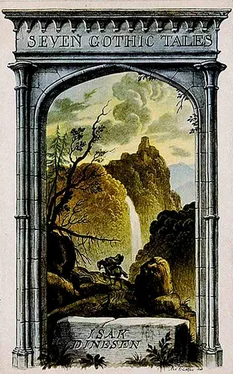Isak Dinesen - Seven Gothic Tales
Здесь есть возможность читать онлайн «Isak Dinesen - Seven Gothic Tales» — ознакомительный отрывок электронной книги совершенно бесплатно, а после прочтения отрывка купить полную версию. В некоторых случаях можно слушать аудио, скачать через торрент в формате fb2 и присутствует краткое содержание. Жанр: unrecognised, на английском языке. Описание произведения, (предисловие) а так же отзывы посетителей доступны на портале библиотеки ЛибКат.
- Название:Seven Gothic Tales
- Автор:
- Жанр:
- Год:неизвестен
- ISBN:нет данных
- Рейтинг книги:5 / 5. Голосов: 1
-
Избранное:Добавить в избранное
- Отзывы:
-
Ваша оценка:
- 100
- 1
- 2
- 3
- 4
- 5
Seven Gothic Tales: краткое содержание, описание и аннотация
Предлагаем к чтению аннотацию, описание, краткое содержание или предисловие (зависит от того, что написал сам автор книги «Seven Gothic Tales»). Если вы не нашли необходимую информацию о книге — напишите в комментариях, мы постараемся отыскать её.
The stories in this collection are:
Deluge at Norderney
The Old Chevalier
The Monkey
The Roads round Pisa
The Supper at Elsinore
The Dreamers
The Poet
Seven Gothic Tales — читать онлайн ознакомительный отрывок
Ниже представлен текст книги, разбитый по страницам. Система сохранения места последней прочитанной страницы, позволяет с удобством читать онлайн бесплатно книгу «Seven Gothic Tales», без необходимости каждый раз заново искать на чём Вы остановились. Поставьте закладку, и сможете в любой момент перейти на страницу, на которой закончили чтение.
Интервал:
Закладка:
This madness took, as already said, the curious form of a firm faith in a past of colossal licentiousness. She believed herself to have been the grand courtesan of her time, if not the great whore of the Revelation. She took her fortune, her house, and her jewels as the wages of sin, collected in her long career of falls, and because of this she was extremely generous with her money, considering that what had been frivolously gathered must be frivolously spent. She could not open her mouth without referring to her days of debauchery. Even Prince Ernest Theodore, the chaste young lover whom she had refused even a parting kiss, figured in her waxwork collection as a victim of her siren’s arts and ferocity.
It is doubtful whether any spectacle can be enjoyed in the same way by those people who may, after all, run a risk of becoming part of it and by those who are by circumstance entirely cut off from any such possibility. The Emperor of Rome himself might, after a particularly exciting show, see the trident and the net in a nightmare. But the Vestal Virgins would lie on their marble couches and, with the knowledge of connoisseurs, go over every detail in the fight, and imagine themselves in the place of their favorite gladiator. In the same way it is unlikely that even the most pious old lady would attend the trial and burning of a witch with quite the untroubled mind of the male audience around the stake.
No young woman could, even from a nun’s cell, have thrown herself into the imaginary excesses of Miss Malin without fear and trembling. But the old woman, who had seen to her safety, could dive down into any abyss of corruption with the grace of a crested grebe. Faithful by nature, she stuck to the point of view of her youth with regard to the Gospel’s words concerning adultery. She had the word of the Bible for it that a multitude of young men had indeed committed it with her. But she resolutely turned them inside out, as a woman will a frock the colors of which have disappointed her by fading. She was the catoptric image of the great repenting sinner whose sins are made white as wool, and was here taking a genuine pleasure in dyeing the pretty lamb’s wool of her life in sundry fierce dyes. Jealousy, deceit, seduction, rape, infanticide, and senile cruelty, with all the perversities of the human world of passion, even to the maladies galantes, of which she exhibited a surprising knowledge, were to her little sweetmeats which she would pick, one by one, out of the bonbonnière of her mind, and crunch with true gourmandise. In all her fantasies she was her own heroine, and she ran through the spheres of the seven deadly sins with the ecstasy of a little boy who gallops through the great races of the world upon his rocking-horse. No danger could possibly put fear into her, nor any anguish of conscience spoil her peace. If there was one person of whom she spoke with contempt it was the Mary Magdalene of the Gospel, who could no better carry the burden of her sweet sins than to retire to the desert of Libya in the company of a skull. She herself carried the weight of hers with the skill of an athlete, and was up to playing a graceful game of bilboquet with it.
Her face itself changed under her great spiritual revolution, and at the time when other women resort to rouge and belladonna, her lenience with human weakness produced in her a heightened color and sweet brilliancy of eye. She was nearer to being a pretty woman than she had ever been before. Like a witch she had always looked, but in her second childhood her appearance had more of the wicked fairy of the children’s tales than of the Medusa, the revenging angel with her flaming sword who had held her own against Prince Ernest. She had preserved her elfin leanness and lightness, and as for her skill as a dancer, she might still be the belle of any great ball. The little cloven hoof beneath was now daintily gilded, like that of Esmeralda’s goat itself. It was in this glow of mild madness and second youth that she now sat, marooned in the hayloft of the peasant’s barn, conversing vivaciously with the Cardinal Hamilcar.
“When, as a boy, I stayed for some time at Coblentz, at the court of the emigrant Duke of Chartres,” the Cardinal said, after a little pause, pensively, “I knew the great painter Abildgaard, and used to spend my mornings in his studio. When the ladies of the court came to him to have their portraits painted—for he was much sought by such fair women who wanted their beauty immortalized—how many times have I not heard him tell them: ‘Wash your faces, Mesdames. Take the powder, rouge, and kohl off them. For if you will paint your faces yourselves I cannot paint you.’ Often, in the course of my life, have I thought of his words. It has seemed to me that this is what the Lord is continually telling the too weak and vain mortals: ‘Wash your faces. For if you will do the painting of them yourselves, laying on humility and renunciation, charity and chastity one inch thick, I can do nothing about them.’ Tonight, indeed,” the old man went on, smiling, as a deep movement of the sea seemed to shake the building, “the Lord is doing the washing for us with his own hands, and he is using a great deal of water for it. But we will seek comfort in the thought that there is no higher honor or happiness for us than this: to have our portraits painted by the hand of the Lord. That alone is what we have ever longed for and named immortality.”
Seeing that the face of the speaker was covered with blood-stained bandages, Miss Malin was about to make a remark, but she restrained herself, for she did not know what lasting disfigurements of a noble presence they might conceal. The Cardinal understood her thought and expressed it with a smile. “Yes, Madame,” he said, “my face the Lord has seen fit to wash in a more ardent spirit. But have we not been taught of the cleansing power of blood? Madame, I know now that it is stronger even than we thought. And perhaps my face needed it. Who, but the Lord, knows what rouge and powder I have put on it in the course of seventy years? Verily, Madame, in these bandages I feel that I am nearer to posing for my portrait by him than I ever have been before.”
Miss Malin blushed slightly at being detected in a lack of tact, and nimbly put back the conversation a little, as one sets back a clock. “I am thankful,” she said, “that I have in my life had neither rouge nor powder on my face, and Monsieur Abildgaard might have painted it at any moment. But as to this divine portrait of me, which is, I suppose, to be hung in the galleries of heaven, when I myself am dead and gone—allow me to say, My Lord, that here my ideas differ from yours a little.
“The ideas of art critics,” said the Cardinal, “are likely to differ; that much I learned in the studio. I have seen the master himself strike the face of a great French painter with a badger’s-hair brush full of cadmium, because they disagreed about the laws of perspective. Impart to me your views, Madame. I may learn from you.”
“Well, then,” said Miss Malin, “where in all the world did you get the idea that the Lord wants the truth from us? It is a strange, a most original, idea of yours, My Lord. Why, he knows it already, and may even have found it a little bit dull. Truth is for tailors and shoemakers, My Lord. I, on the contrary, have always held that the Lord has a penchant for masquerades. Do you not yourself tell us, my lords spiritual, that our trials are really blessings in disguise? And so they are. I, too, have found them to be so, at midnight, at the hour when the mask falls. But at the same time nobody can deny that they have been dressed up by the hand of an unrivaled expert. The Lord himself—with your permission—seems to me to have been masquerading pretty freely at the time when he took on flesh and dwelt amongst us. Indeed, had I been the hostess of the wedding of Cana, I might have resented the feat a little—I might, I tell you, My Lord—had I there asked that brilliant youth, the carpenter’s son, in order to give him a treat on my best Berncastler Doktor, and he had, at the moment when it suited him, changed pure water into a far finer vintage! And still the lady did not know, of course, of what things he was really capable, being God Almighty.
Читать дальшеИнтервал:
Закладка:
Похожие книги на «Seven Gothic Tales»
Представляем Вашему вниманию похожие книги на «Seven Gothic Tales» списком для выбора. Мы отобрали схожую по названию и смыслу литературу в надежде предоставить читателям больше вариантов отыскать новые, интересные, ещё непрочитанные произведения.
Обсуждение, отзывы о книге «Seven Gothic Tales» и просто собственные мнения читателей. Оставьте ваши комментарии, напишите, что Вы думаете о произведении, его смысле или главных героях. Укажите что конкретно понравилось, а что нет, и почему Вы так считаете.












